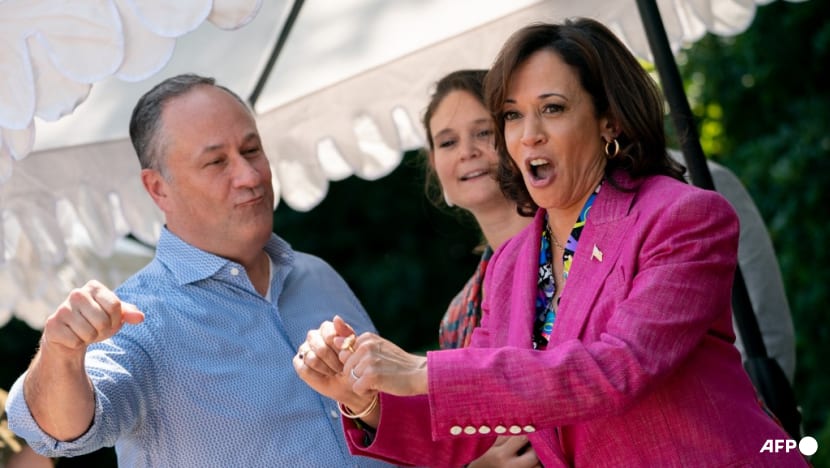Commentary: Kamala Harris is being called ‘brat’. What the sigma?
US Vice President Kamala Harris is embracing Gen Z trends after being called "brat" by British singer Charli XCX. Is it cool or cringe? NTU lecturer Ian Tan weighs in.

US Vice President Kamala Harris and her husband Doug Emhoff dance as DJ D-Nice performs during a 50th Anniversary of Hip Hop event at the residence of the Vice President in Washington, DC, on Sep 9, 2023.
(Photo: AFP/Stefani Reynolds)

This audio is generated by an AI tool.
SINGAPORE: When my students least expect it, I will invoke their secret slang.
For example, during my lesson, I would say, “The CEO in our marketing case study here has been described as charismatic. He’s got rizz.”
This elicits giggles because the undergraduates do not expect a middle-aged lecturer to use Gen Z slang. I try not to “flex” (show off) too much, lest I be called a “try hard”, or a person who is trying too hard to impress others.
Thus, when US Vice President Kamala Harris leaned into Gen Z slang, I wondered if this was going to be “a fail” in her presidential campaign.
IS HARRIS A "BRAT"?
On Jul 22, British singer Charli XCX tweeted that “kamala IS brat”, showing her support for Harris’ bid for the US presidency. Brat is the name of Charli’s latest hit album.
Within a day, the Harris team updated her X (formerly Twitter) campaign account to mimic the lime-green design of the Brat album cover. Online users then started creating remix videos featuring Harris’ distinctive laugh and puzzling quotes (eg. “You think you just fell out of a coconut tree?”) set to the beat of Charli’s songs, as well as other singers like Beyonce and Taylor Swift.
I was scratching my head, as I couldn’t connect Harris with Charli’s definition of a brat.
Charli said that “brat” means “that girl who is a little messy and likes to party … maybe says dumb things sometimes … who feels herself but maybe also has a breakdown but parties through it … is very honest, very blunt, a little bit volatile.”
The Guardian provides an explainer: “Brat is not just a name, but a lifestyle, one inspired by noughties excess and rave culture.”
I remained befuddled but what do I know? The remix videos featuring Harris have chalked up millions of views on TikTok and she has raised a staggering US$200 million in campaign funds alone in the first week of her presidential campaign, with 66 per cent of donations coming from first-time donors.
Harris’ use of pop culture slang appears to have also perplexed her political opponents. Donald Trump and the Republican party have yet to come up with any effective response to the “brat” movement.
Harris (or her team) clearly knows the power of slang words to include and exclude.
Should we of the older generations embrace Gen Z slang like Harris?
DON’T BE CRINGE
First, avoid using slang words that do not “belong” to you or your social circle.
As far as I know, Harris has not used the word “brat” in any of her speeches, because that would have been “cringey”. Instead, she has let Gen Z do its thing, while she has focused on using plain English to promote her policies and to take down Trump.
Slang words begin life when people shorten words for convenience (eg. “rizz” from charisma, “legit” from legitimate, “diss” from disrespect).
Slang words also tend to be created by younger people who want to differentiate themselves from older generations. That is why such words can capture a generation’s zeitgeist, delineating the eras when they had to start “adulting”.
The Boomers used terms like “hippie” and “groovy”, reflecting the counterculture movement of the 1960s. Gen X folks had “yuppies” and “bandwidth” which were influenced by the “Wall Street” movie and the birth of the Internet during the 1980s and 1990s.
As such, each generation tends to frown at slang words created by younger generations.
I was amused when my 19-year-old Gen Z daughter said she found Gen Alpha (defined as those born between 2010 and 2025) slang words such as “skibidi” and “sigma” strange.
Imagine how we Gen X folks feel about such words.
SLANG HELPS US TO EMPATHISE WITH OTHERS
Second, even if we have no use for them, there is value in learning the slang words of younger people.
Slang words speed up communication, but they can also reflect how young people are dealing with the challenges and disruptions in their lives.
For example, the phrase “lie flat” or “tang ping” originated from Chinese youth who rejected societal pressures to work long hours and pursue traditional standards of success.
“Sus” (suspicious) gained popularity with the game Among Us but is often used now as people have to deal with increasing misinformation and scams.
I also hear more people using “nepo baby” when referring to schoolmates who come from privileged backgrounds, hinting at their resentment about rising wealth inequality.
We use words to help us make sense of the world. Knowing the words other people use thus helps us empathise with them better.
SLANG WORDS KEEP EVOLVING
Finally, our generation’s slang words can shift in meaning over time, so know how they are used today.
You can get up to speed on slang words with the help of online English dictionaries or pop culture sites like Know Your Meme and Internet & Text Slang Dictionary.
Take for example “LOL” (laugh out loud). When it first appeared in the 1980s, it meant to say that something was funny.
Today, it is used more as a filler word, a quick acknowledgement of an unimportant message, or for softening critique like “Your speech was too long, LOL, but I liked it.”
By the way, after several generations, a slang word can change dramatically in meaning.
According to Britannica, a geek was “originally an early 20th-century term for a carnival worker who was so unskilled that the only thing the worker could do at the carnival to entice an audience was to bite off the heads of live animals”.
Tell that to the geeks Satya Nadella and Mark Zuckerberg who are running the world’s biggest companies.
Ian Yong Hoe Tan is a strategic communications lecturer at the Wee Kim Wee School of Communication and Information, Nanyang Technological University. He has more than two decades of experience working in the media and technology industries.




















